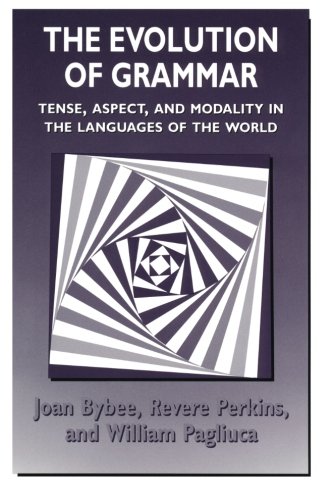The Evolution of Grammar: Tense, Aspect, and Modality in the Languages of the World ebook download
Par carpenter kathy le lundi, août 31 2015, 21:56 - Lien permanent
The Evolution of Grammar: Tense, Aspect, and Modality in the Languages of the World by Joan Bybee, Revere Perkins, William Pagliuca


The Evolution of Grammar: Tense, Aspect, and Modality in the Languages of the World Joan Bybee, Revere Perkins, William Pagliuca ebook
Format: pdf
Page: 398
ISBN: 0226086658, 9780226086651
Publisher: University Of Chicago Press
One of the most complex and challenging English language areas that learners have to master in the development of their interlanguage is the use of verb forms, especially the correlation between tense, time and aspect. It focuses on Bacon's intentionalist approach in speculative grammar, as well as his contributions to the fields of semantics, semiotics, evolutionary linguistics and universal grammar. Research from top linguistics scholars; Detailed analysis of phonology, morphology, and syntax of ancient languages; Valuable discussions for students at introductory and scholarly levels by Blane Conklin; Biblical Hebrew Grammar Visualized by Francis I. Some languages can be said to lack aspect; others, tense, at least. While many of his writings were composed with an eye towards theological questions such as biblical exegesis, he also considered pedagogical, ethical and political aspects of language, such as how language can be used to convert infidels or provide moral order for society. This possibly occurs because English language teaching methodologies which deal with these grammatical categories somewhat struggle to establish a clear relationship between these three grammatical elements (DeCarrico: 1986). Back to the beginning of the Proto-World thread]. This encourages the application of a “picture theory” of language: words “mirror” real world objects or states of affairs and the meaning of a word (or any linguistic expression) consists of its truth conditions (Wittgenstein, 2001; Ayer, 1987). Posted by Piotr sporadic and dynamic ways. Articles, gender/classifiers, case markers, pronouns/agreement, speech-act markers, tense-aspect-modality, complementizers and subordinators', T. Perhaps a lack of abstract nouns or metalinguistics? Cook; Diachrony in Biblical Hebrew edited by Cynthia L. Dean Forbes; Time and the Biblical Hebrew Verb: The Expression of Tense, Aspect, and Modality in Biblical Hebrew by John A. That is part of the “whole way of life, a whole set of solutions to problems, a whole classification system and body of knowledge about the natural world, a whole calendar system, a whole complex of myths, folktales, and songs,” that I also believe in preserving from my own language and culture. Concrete nouns come from calls, verbs from gestures, with grammar to establish a general logical relationship then what? But looking at that, we have human languages claimed to lack some of those features. Thanks for Even though I share the concern for languages lost to history, I can't help thinking about one aspect, that seems to get left out of this discussion time and again.
Yanni - In My Time (Piano Solos) Sheet Music epub
After the Trade Is Made: Processing Securities Transactions ebook
Color atlas of periodontology pdf download